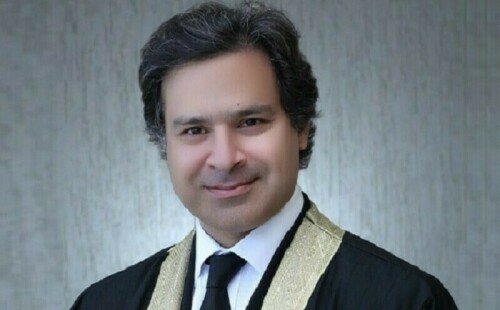BAGHDAD, Nov 7: Prime Minister Iyad Allawi on Sunday declared a state of emergency in Iraq to combat spiralling violence as 21 police officers were shot dead execution-style in a dawn ambush on their stations.
Allawi's move, which will grant the Iraqi authorities sweeping powers to impose order, came as troops from the United States and Iraq carried on with intense preparations for an expected assault on Fallujah.
The state of emergency, scheduled to last for 60 days, applied for the whole country except for the northern region of Iraqi Kurdistan, Allawi's spokesman Thaer Naqib said.
Under a state of emergency, Iraqi authorities have powers allowing them to impose curfews, ban meetings and bug communications, in moves which echo the authoritarian rule of toppled president Saddam Hussein's regime.
The decision was made after all peaceful channels to stop a wave of deadly bombings and killings in the country had failed, Naqib said. Allawi was due to give more details about the measures on Monday.
It was "due to an increase in violence and terrorism in the form of daily mass slaughter, targeting even women and children," he told a news conference.
The rebels were intent on wrecking Iraq's infrastructure and derailing the government's plans to hold national elections by January, Naqib charged.
A curfew has already been imposed on the restive city of Samarra, north of Baghdad, after a string of car bombs and clashes against police stations and local government targets Saturday left 36 people dead and scores injured.
Adding to the slaying of symbols of the US-backed government, 21 policemen were killed in a dawn ambush on two police stations in the restive province of Al-Anbar, which is also home to Fallujah.
"The attackers disarmed the police, gathered them together and then shot them dead," said an officer at one of the stations.
The ability of rebel fighters to regroup and lash out with impunity in the face of superior US firepower has raised questions among analysts about the effectiveness of using military might over diplomacy.
But Allawi has vowed to crush the insurgency ahead of elections by force if necessary and has set his sights on Fallujah, west of Baghdad, which is believed to house followers of Iraq's most wanted militant, Abu Musab al-Zarqawi.
Some 20,000 US and Iraqi troops have gathered around the Sunni Muslim bastion, waiting for Allawi to give the nod for a full-scale assault.
The prime minister, who returned earlier on Sunday from a brief trip to Europe, has issued an ultimatum to the city to surrender its rebel fighters or face attack, but Fallujah leaders insist that men like Zarqawi do not live there.
In an ever-intensifying campaign of bombardment, seven US air strikes levelled arms caches stored in the rebel enclave over a 24-hour span, the marines said.
Four Iraqi civilians were wounded during the raids, hospital officials said.
As they waited for a possible go-ahead for what might be their hardest fight since last year's invasion, US marine commanders gave morale-boosting talks.
"You will be making history... Forty years from now, 100 years from now, they (people) will be talking about the battle of Fallujah," said Major General Richard Natonski, the top commander for the Marines Corps First Division.
Rebels have transformed Fallujah into their fiefdom since a marine assault on the city in April ended in stalemate and left hundreds dead. Tens of thousands have since fled the 300,000-strong city in fear of greater bloodshed.
US and Iraqi troops have been massing around the city since mid-October, while the US military is doubling its manpower in Fallujah's sister city of Ramadi to 2,000 amid expectations of a double-pronged assault to regain control.
Analysts, however, doubt the military route is the answer to Iraq's woes, pointing at the resurgence of violence in Samarra barely one month after it was apparently reclaimed from rebel control in a major US-Iraqi offensive.-AFP














































Dear visitor, the comments section is undergoing an overhaul and will return soon.